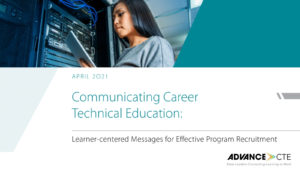February 1 marks the start of Career Technical Education (CTE) Month, a national celebration of the impact of CTE on learners, families, educators, our workforce and our communities. It is a critical opportunity to conduct communications and outreach to introduce CTE to audiences who may not be aware of it or may have historical stigmas about its value. In doing so, you can cultivate more diverse interest in your programs and cultivate new CTE champions.
We asked states what they already have planned, and these were some of their responses.

Here are five tips to help you push the limits and maximize your CTE Month Activities to create impact not just in February but all year long:
Tip 1: Use Your Activities to Tell A Story
Your CTE Month activities should be designed to advance your top legislative, strategic plan and programmatic goals. Consider who is invited to your events, who is featured as speakers and what materials should be shared. Combine your top quantitative outcomes with impactful stories from CTE stakeholders to proactively address stigmas or opposition to your goals and reach audiences needed to advance these goals.
Tip 2: Choose Impact over Quantity
We know staff capacity is limited. Therefore, it is important that work invested in your CTE Month events and activities are not done just only of tradition, but also because they are impactful in advancing goals and reaching your target audience.
Here are some questions to ask: What audiences do you need to reach during CTE Month? Do your current activities equitably reach those audiences? Do your activities reach new audiences?
Tip 3: Be Intentional About Who You Spotlight
Equity and access should be embedded in all CTE Month activities. Consider whether the visual representation, wording used, languages and formats allow your intended audiences to fully know about and participate in the activities.
Additionally, consider whether all audiences are represented in your events, and if there are specific voices you need to add to your table. Perhaps you have an event for all employers, but are there employers with internship or placement programs supporting special populations that you should target to connect to current work? would it be more impactful to engage specifically with employers with existing programs to support learners transitioning out of foster care or learners with disabilities?
Tip 4: Activate your CTE Champions
You don’t have to do all CTE Month activities yourself! Consider how your existing champions across policymakers, educators, employers, etc. can hold their own events, leverage existing events to highlight CTE, and/or make introductions to bring new CTE champions to the table. This is particularly important to closing representation gaps in your programs or garnering support for legislative or policy initiatives.
Tip 5: Make CTE Month Year Round!
Make sure your events aren’t a one-time impact! If some of these tips are causing you to reevaluate your current activities, consider if there are adjustments or new events that can be held throughout the remainder of 2024 to make CTE a larger story that builds toward advancing your goals and initiatives.
Use Advance CTE’s communication and advocacy resources to reach families, employers and policymakers:
- Core Messages for Attracting Learners to CTE
- Digital graphics and print templates
- Fact Sheet and Key Messages: Communicating the Value of CTE to Employers
- Resources to Engage with Policymakers
Stacy Whitehouse, Communications Manager


 Today, Advance CTE released a
Today, Advance CTE released a